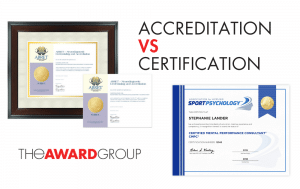Accreditation certificates validate that an organization, program, or individual meets established standards of quality and excellence. These certificates come in various types, including educational, professional, and industry-specific accreditations. At The AWARD GROUP, we specialize in crafting elegant, professional and customized certificates that reflect prestige and credibility. Benefits include enhanced reputation, compliance assurance, and increased trust among stakeholders. To obtain accreditation certificates, entities typically undergo a thorough evaluation process by an authorized accrediting body. Let us help you honor achievements with distinction and professionalism.
What are Accreditation Certificates?
Accreditation certificate meaning refers to official recognition that an individual or organization meets established standards of quality and excellence. Accreditation certificates are official documents that recognize an organization or individual for meeting specific standards of excellence. They are commonly awarded in education, healthcare, business, and other professional fields. At The AWARD Group, we design high-quality, custom accreditation certificates that convey trust, credibility, and achievement—perfect for showcasing compliance and distinction in any industry.
Benefits of Accreditation Certificates for Organizations
Accreditation certificates offer organizations a recognized mark of quality, boosting credibility, compliance, and stakeholder trust across industries. These certificates signal that a company adheres to industry best practices and maintains high standards. They help demonstrate a commitment to excellence, which can significantly impact reputation and growth. Whether in healthcare, education, or corporate sectors, accreditation is a powerful tool for building long-term success and recognition. At The AWARD Group, we take pride in providing accreditation certificates that speak to the achievement and enhance your organizations reputation for excellence.
1 . Enhanced Reputation
Accreditation certificates demonstrate that your organization meets high industry standards, helping build a strong, credible reputation with clients, partners, and the public. This recognition can lead to increased visibility and trust.
2. Increased Stakeholder Confidence
With verified accreditation, stakeholders—such as investors, customers, and regulators—are more likely to trust your services, products, or processes, knowing they align with recognized quality benchmarks.
3. Improved Operational Efficiency
Accreditation often requires streamlined systems and processes, encouraging organizations to refine internal operations. This leads to better productivity, fewer errors, and a more efficient workplace culture.
4. Competitive Market Advantage
Holding accreditation certificates can give organizations a distinct edge in the marketplace by signaling excellence and reliability. It differentiates your brand in competitive bids or procurement processes.
5. Regulatory and Legal Compliance
Accredited organizations are often better prepared for audits, inspections, or legal reviews. Accreditation ensures adherence to regulations, minimizing legal risks and potential penalties over time.
6. Attracting Top Talent
Professionals prefer working with reputable, accredited companies. Accreditation certificates make your organization more appealing to skilled talent looking for stability and growth opportunities.
Types of Accreditation Certificates
Accreditation certificates come in various forms, each tailored to specific industries and standards. These certificates validate excellence, compliance, and professionalism across different organizational functions and sectors.
1. Educational Accreditation Certificates
Awarded to schools, colleges, and training institutions, these certificates confirm that an academic program meets established standards of quality. They enhance credibility and ensure recognition of degrees or credentials by employers and other institutions.
2. Healthcare Accreditation Certificates
These are granted to hospitals, clinics, and medical practices that meet strict safety, care, and operational standards. They help assure patients and regulatory bodies of the institution’s commitment to quality healthcare delivery.
3. Professional Accreditation Certificates
Often issued by professional bodies, these certificates verify an individual’s or organization’s qualifications, skills, and ethical standards within a specific profession. They enhance trust and increase opportunities for advancement and credibility.
4. Corporate or Business Accreditation Certificates
Businesses receive these certificates to demonstrate compliance with industry regulations, ethical practices, or quality management standards. They improve reputation, support customer trust, and can lead to increased partnerships and market share.
5. Environmental or Sustainability Accreditation Certificates
Organizations that meet eco-friendly and sustainable practices may receive these accreditations. They show a commitment to environmental responsibility, which can enhance brand image and appeal to conscious consumers and investors.
How to Obtain Accreditation Certificates
To obtain accreditation certificates, an organization must apply to a recognized accrediting body relevant to its industry. The process typically involves submitting documentation, undergoing evaluations, and meeting established standards of quality and compliance. Once approved, the accrediting body issues the official certificate. At The AWARD Group, we specialize in designing custom, high-quality accreditation certificates that reflect your organization’s achievements with professionalism and prestige.
Difference Between Accreditation vs Certification
Based on the table shown in the image, here are the key differences between accreditation and certification:
| Attribute | Accreditation | Certification |
|---|---|---|
| Scope / Subject | Applies to institutions, programs, organizations, or systems. | Applies mainly to individuals, though it can also cover products, services, or systems. |
| Purpose / Focus | Ensures quality, credibility, and standards for institutions or programs; emphasizes continuous improvement and public trust. | Verifies that a person or product meets specific criteria or competencies. |
| Authority Bodies | Granted by external, independent accrediting bodies or recognized authorities. | Granted by certifying organizations, which may be third-party or related entities. |
| Voluntary vs Required | Often required or strongly recommended, especially in sectors like healthcare or education. | Usually voluntary, though some roles or fields may require it. |
| Level of Credibility / Recognition | Generally, has high credibility; recognized by governments, institutions, and professionals. | Varies—third-party certifications are more credible than second-party ones; credibility depends on the certifying body. |
| Frequency / Renewal | Requires periodic audits and ongoing compliance reviews. | Also requires renewal or re-certification, especially to keep up with changing standards. |
| Standards / Criteria | Involves broad, institutional standards covering resources, governance, curriculum, outcomes, etc. | Focuses on specific competencies, skills, or knowledge, often tied to individual performance or product criteria. |
| Measurement / Evaluation | More in-depth and holistic, often evaluating policies, structures, and institutional outcomes. | More targeted and performance-based, assessing whether individuals/products meet defined benchmarks. |
Conclusion
Accreditation certificates play a vital role in validating the quality and credibility of institutions, distinguishing them from individual or product-based certifications. Understanding the differences between accreditation and certification helps organizations make informed decisions about their recognition needs. At The AWARD Group, we specialize in crafting premium, customized accreditation certificates that reflect excellence and professionalism. Let us help you celebrate your organization’s achievements with distinction. Contact us today to create certificates that make a lasting impression.
Frequently Asked Questions
Q1. Can accreditation improve employee training and performance?
Ans. Yes, accreditation encourages organizations to follow best practices and maintain high standards, which directly improves employee training quality and overall performance. It promotes continuous improvement and ensures staff are equipped with up-to-date skills and knowledge.
Q2. Is it mandatory for all organizations to be accredited?
Ans. No, accreditation is not mandatory for all organizations. However, many industries strongly recommend or require it to ensure compliance, quality, and credibility. Accreditation often enhances reputation and trust, giving organizations a competitive advantage.
Q3. What is the fundamental difference between accreditation and certification?
Ans. Accreditation evaluates and validates entire organizations or programs against broad standards, while certification verifies that an individual, product, or service meets specific competencies or criteria. Both serve distinct but complementary roles in quality assurance.
Q4. What role do accreditation certificates play in consumer protection?
Ans. Accreditation certificates assure consumers that an organization meets rigorous quality and safety standards. They help protect consumers by promoting transparency, reliability, and accountability, reducing risks associated with substandard products or services.









